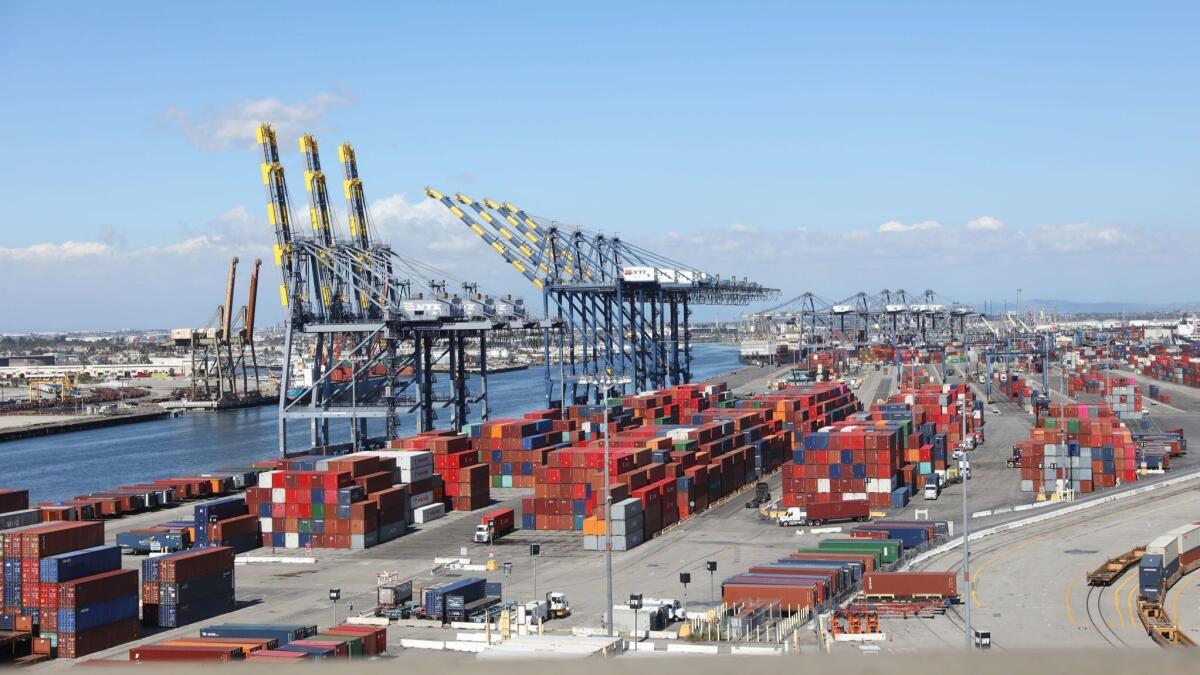Editorial: The shipping industry emits as much carbon as all of Germany. That’s unacceptable

- Share via
Finally, the shipping industry will be asked to do its part to fight climate change. The United Nations’ International Maritime Organization, which regulates the industry, agreed in London last week to set a 2050 goal of reducing emissions from oceangoing cargo ships to 50% below the 2008 level.
It’s an ambitious goal, and the details on how it is to be achieved are still being worked out, but climate experts say the sector still needs to do more if the world is to meet the 2015 Paris agreement goal of limiting global warming to 2 degrees Celsius above pre-industrial levels.
In other words, the shipping pact is a nice, if late, start, but the global shipping industry needs to keep working toward the ultimate goal of phasing out fossil fuels entirely.
Does it matter? Is shipping really an important front in the war against global warming? Surprisingly, international maritime shipping emits levels of greenhouse gases that collectively are on par with Germany, which has the world’s sixth-highest level of emissions. Driving the maritime emissions has been the sector’s reliance on heavy fuel oil, a cheap but dirty-burning energy source that spews high levels of sulfur and other gases and particulates into the atmosphere. The industry, which moves at least four-fifths of the world’s cargo, has been shifting from heavy fuel oil to liquid natural gas and other alternatives, and the International Maritime Organization will require all new ships added to fleets after 2025 to be 30% more efficient than those built under current construction designs.
Maritime shipping is economically efficient, but its carbon footprint is outsized.
But more needs to be done, as increasingly globalized trade means more ships sailing more miles. The European Union estimated that maritime emissions could rise from 2.2% of global emissions to 17% if left unchecked.
The nature of maritime shipping (as with international aviation) makes it hard to regulate. Although individual countries have adopted national emissions caps under the Paris agreement, it is hard to know how to count shipping emissions. Much of the pollution is emitted in international territory, and the ships themselves are predominately registered in small nations with limited regulation; Panama, Liberia and the Marshall Islands are the three most common. Meanwhile, the bulk of shipping is moving among the nations with the largest economies and highest carbon emissions.
That makes it difficult to assign the emissions to specific countries, and that’s why international shipping and aviation were left out of the historic Paris agreement that (eventually) led every nation on the planet to agree to reduce carbon emissions in an effort to cap global warming. President Trump since has pledged to withdraw the U.S. from that supposed “bad deal,” evidence that he neither knows what makes a good deal nor what the implications are for the American people if global warming is not reined in.
The International Maritime Organization now must come up with a muscular and workable plan to hold individual nations responsible for enforcing global regulations on emissions. That could be good news for the ports of Los Angeles and Long Beach, which, to their credit, have pledged to slash greenhouse gas emissions and diesel pollution from the shipping and freight industries, but face intense competitive pressure from other U.S. ports with less stringent environmental policies.
This will not be an easy transition. Maritime shipping is economically efficient when you measure the price and amount of heavy fuel oil used against the amount of cargo moved, but its carbon footprint is outsized. The sector needs to find and adopt more climate-friendly ways. International aviation regulators and companies also are looking at technologies and approaches to offset or reduce emissions under a pact reached in 2016 through the U.N.’s International Civil Aviation Organization. But they, too, need to do more, and faster.
Unfortunately, the U.S. — an integral part of the international shipping and aviation worlds — has under the current administration abdicated its responsibility to be a global leader in fighting climate change. The current (and maddening) deregulatory push by the Environmental Protection Agency, and the rush by the Department of the Interior to sell oil and gas leases, are being slowed by legal challenges and market forces, thank goodness. Gov. Jerry Brown told a Canadian audience Monday that the Trump administration poses a “momentary deviation” in the United States’ fight to control global warming. We hope he’s right. But even those at the forefront of the fight still need to do more. And reducing ship emissions is a significant piece of that.
Follow the Opinion section on Twitter @latimesopinion or Facebook
More to Read
A cure for the common opinion
Get thought-provoking perspectives with our weekly newsletter.
You may occasionally receive promotional content from the Los Angeles Times.










